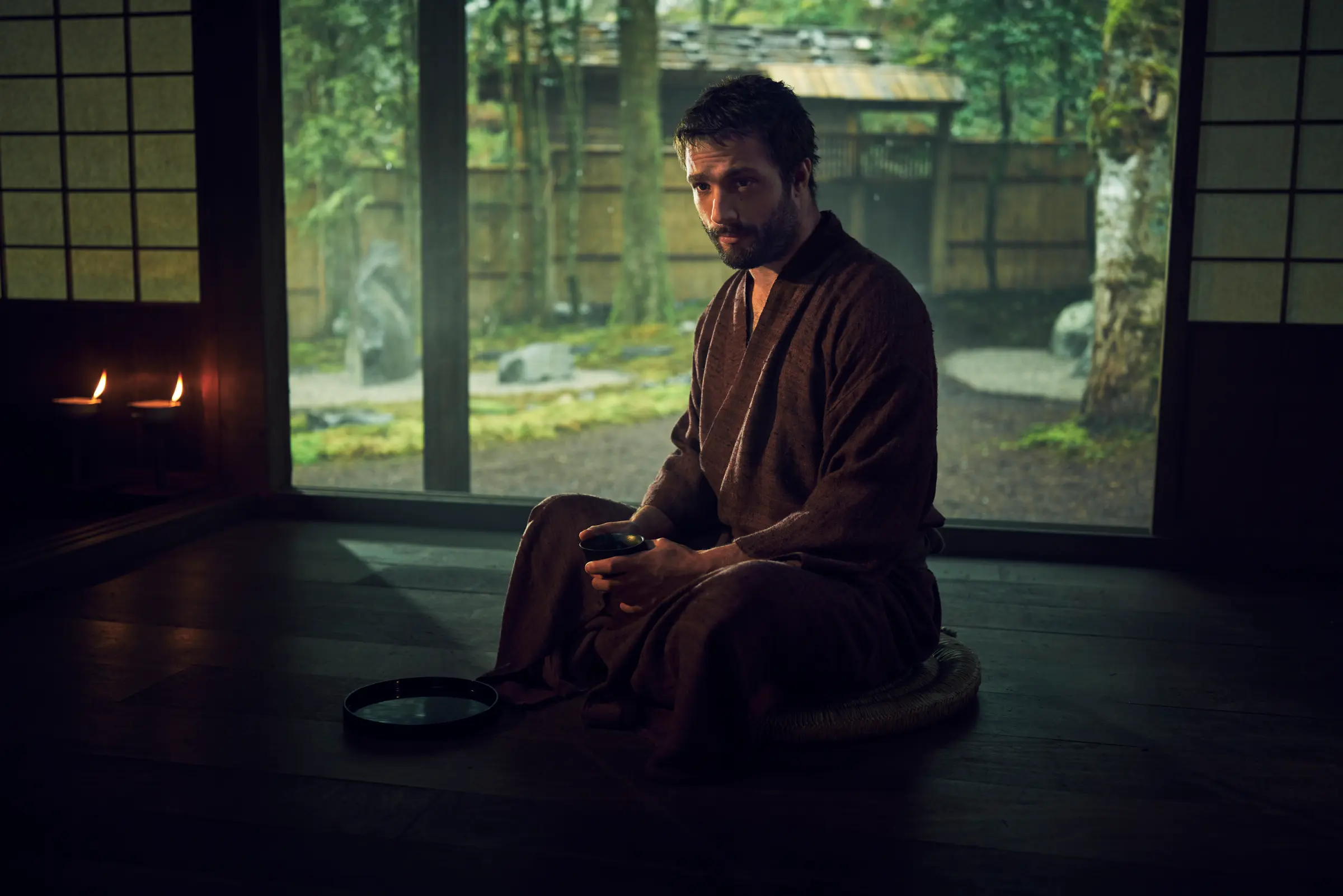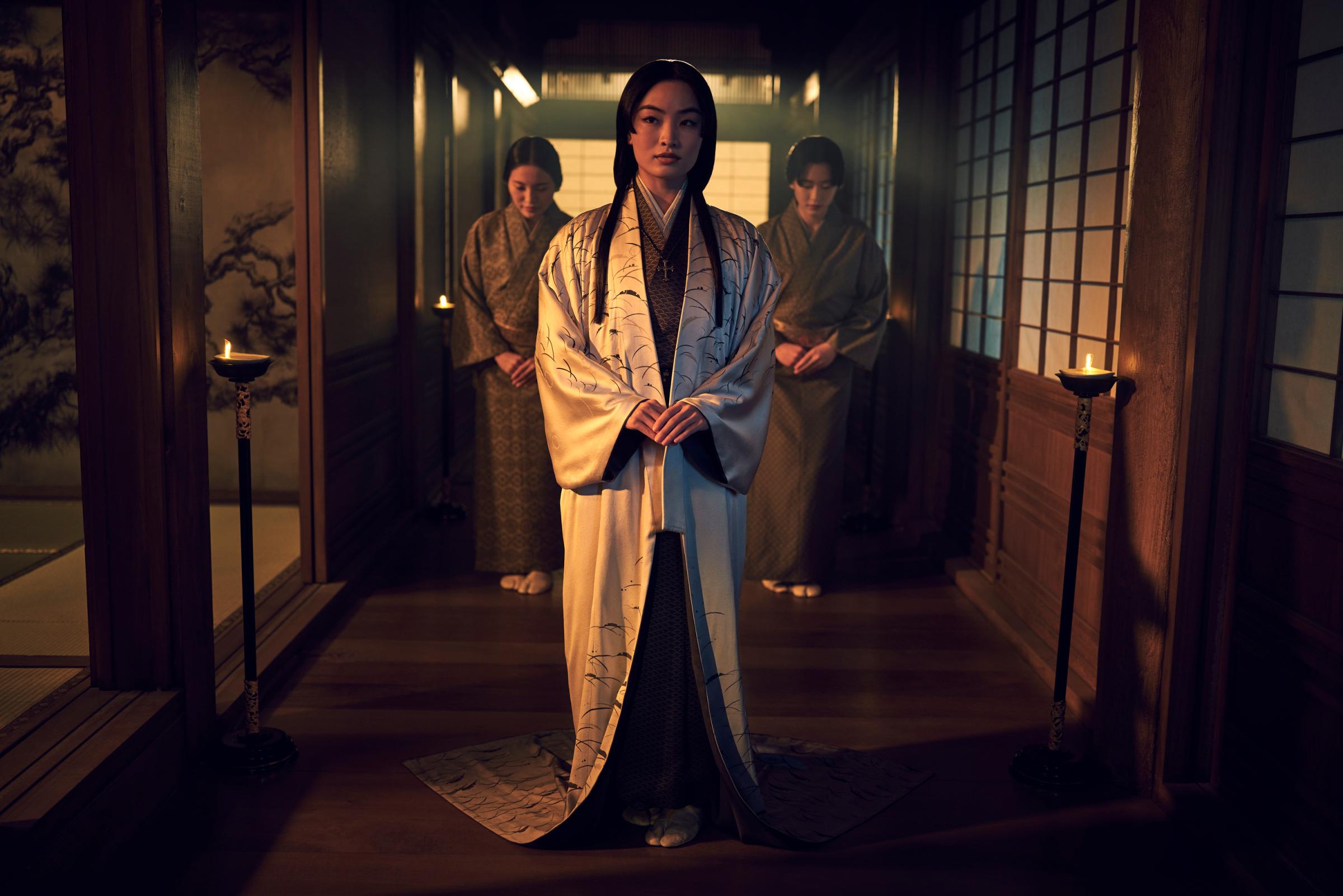It takes a bit of hubris to mess with one of the defining TV events of the 20th century. The original Shōgun, a five-part miniseries based on James Clavell’s best-selling 1975 doorstop, was a massive hit when it aired on ABC in 1980. Nearly a third of American households tuned in to watch a cast led by Richard Chamberlain and the iconic Japanese actor Toshiro Mifune retell the tale of an English navigator’s adventures in feudal Japan. Shōgun broke broadcast barriers with its frank depictions of sex and violence, and racked up awards. Could there possibly be any point, beyond the entertainment industry’s thirst for familiar IP, to revisiting this story in 2024?
The answer, remarkably, is yes. The new Shōgun, whose two-episode premiere comes to FX and Hulu on Feb. 27, is not a remake so much as a radical reimagining. Adapted directly from Clavell’s novel, this sprawling, 10-part historical drama takes a far broader view than its predecessor, moving beyond the Western outsider’s perspective to survey a fracturing society that is just as baffled by this interloper’s ways as he is by theirs. It’s an epic of war, love, faith, honor, culture clash, and political intrigue. And at a time when so many of TV’s biggest swings, from Amazon’s The Rings of Power and Citadel to Netflix’s Stranger Things and The Crown, have yielded at least partial misses, FX’s Shōgun stands apart as a genuine masterpiece.
The cross-cultural encounter begins in the year 1600, when a battered European ship emerges out of the pre-dawn fog off the coast of a Japanese fishing village. Leading its scraggly, malnourished crew is John Blackthorne (Cosmo Jarvis from Persuasion), an English pilot with an irrepressible survival instinct. Unfortunately for him, local leaders aren’t exactly pleased to receive his filthy delegation. (One puts him in his place by urinating on his head.) Even more hostile to a ship full of Protestants seeking a foothold in Japan are the Portuguese Catholics enlisted as the pilot’s translators, who have already established trade and churches there.

Blackthorne soon stumbles into a crisis far bigger than his own. A year after the death of the reigning Taikō, a Council of Regents has been established to govern Japan until the late leader’s young son is old enough to take his place. One regent, Lord Yoshii Toranaga (producer Hiroyuki Sanada), an aging war hero based in Edo, has fallen out with the other four, who are intimidated by his growing power and independence. Summoned to Osaka, Toranaga is threatened with impeachment. His reaction could plunge the nation into a civil war.
A brilliant strategist, Toranaga knows how useful a ship containing 500 muskets and 20 cannons—as well as a “barbarian” who knows how to use them—could be to him in a land where wars are generally waged by sword-wielding samurai. So Blackthorne, rechristened Anjin (the Japanese word for pilot), is transported to Osaka, where his fate and that of the embattled regent become inextricably entwined. Toranaga enlists Toda Mariko (Anna Sawai), a noblewoman who has converted to Christianity, as the Anjin’s translator. The first time we see this shrewd, steadfast, stoic yet heartbroken character, she’s calmly coaxing a young mother to surrender her baby to be slaughtered as part of her disgraced husband’s seppuku.
Blackthorne may be the character viewers encounter first, just as he was in the original Shōgun. He also speaks English, though the language often stands in for the Westerners’ and Christians’ lingua franca, Portuguese. Yet in this telling, from co-creators Justin Marks (Top Gun: Maverick) and Rachel Kondo, Toranaga and Mariko are just as much protagonists as the man they call Anjin. The three have something in common: each is a savvy reader of social situations engaged in a struggle for survival. Blackthorne must navigate an unfamiliar culture, with intricate customs, if he ever wants to see his crew, ship, or homeland again. Toranaga, who insists he has no ambitions of becoming shōgun, will be killed and his clan decimated on the battlefield if he doesn’t approach his conflict with the Council correctly. Mariko, the wife of a brutish warrior (Shinnosuke Abe) and the daughter of a dishonored family, feels called to suicide but forces herself to keep living in deference to her Catholic beliefs and out of loyalty to Toranaga.

Crucial to this widening of scope is Marks and Kondo’s decision to not only have the Japanese characters—who comprise the vast majority of the cast—speak their own language, but also to translate their words for Anglophone audiences using subtitles. Mifune, et al. spoke Japanese in the 1980 version as well, but like Blackthorne, Americans who didn’t know that language could only understand what they were saying in scenes where the Anjin communicates through a translator. That conceit kept viewers grounded in, but also confined to, the pilot’s bewildered point of view, holding the Japanese characters and the society they inhabited at arm’s length.
A bit of a no-brainer in 2024, when TV audiences are international and multilingual series increasingly common, the subtitles alone are enough to justify the remake. Toranaga, Mariko, and their countrymen are no longer othered by default; we hear them candidly marvel at the Anjin’s strange ways, his appetite for rabbit stew and aversion to baths. In terms of storytelling, viewers’ ability to understand what the Japanese characters are saying to one another opens up Shōgun’s world immensely. We get private conversations, backstories, access to the inner lives of scheming double agents and ambitious courtesans and sons impatient to prove themselves through combat. The expanded perspective makes the series a true, immersive saga, complementing performances that move fluidly between subtlety and grandeur, staged amid sumptuous visuals that contrast dramatic coastal vistas and firelit minimalist interiors with the violence of warfare and seppuku. (There is quite a bit of suicide in this show.)
I think it’s possible to make great television on any scale, but too many flawed streaming-era epics have made it tempting to assume that such grand, historical and speculative stories are better suited to the big screen, if not tomes as thick as phone books. Billion-dollar world-building aside, The Rings of Power plods. Apple’s Foundation and Pachinko nail the aesthetic elements of the classic books they’re based on but muddle their plots beyond recognition. Empty spectacles like Citadel and See were dead on arrival. The Crown, Stranger Things, The Mandalorian, and especially Game of Thrones flourished for a while, then fizzled or flamed out. The Underground Railroad, Barry Jenkins’ stunning 2021 adaptation of Colson Whitehead’s alternate history of American slavery, was starting to look like the exception that proved the rule.
Almost three years later, as the streaming landscape contracts and content spends shrink, Shōgun stands as more vital evidence that the medium can still achieve greatness—and that its splashiest, most cinematic efforts are just as capable of excellence as the talkier, more grounded dramas and comedies that critics often prefer. The factors common to all great serialized stories, regardless of scale, are simple: compelling characters, ingenious plots, universal themes. TV’s second Shōgun teems with all of the above. The costly embellishments are just a bonus. Call it a remake if you must, but few shows out there feel fresher.
More Must-Reads from TIME
- Cybersecurity Experts Are Sounding the Alarm on DOGE
- Meet the 2025 Women of the Year
- The Harsh Truth About Disability Inclusion
- Why Do More Young Adults Have Cancer?
- Colman Domingo Leads With Radical Love
- How to Get Better at Doing Things Alone
- Michelle Zauner Stares Down the Darkness
Contact us at letters@time.com